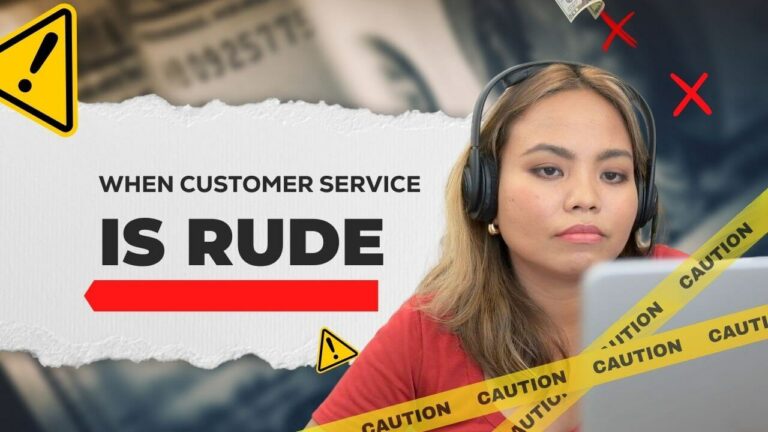This is a request by YouTube user @meeprincess9510: An accrued interest mock call when the client paid their balance in full last month and got a new bill for $2 dollars being an interest only statement. How to explain that in a concise and simple direct manner while providing key education to the customer? This mock call will show you how to explain unexpected charges that customers might find difficult to accept and understand.
Agent: Thank you for calling Kwestyon Credit. This is Candace. How may I help you today?
Customer: Hi, I received my statement today, a grand total of $2.00. How wonderful! Except that this should have been zero, not $2.00 because I paid my balance in full last month. So can you guys tell me what’s going on?
Agent: Thank you for calling Kwestyon Credit. This is Candace. How may I help you today?
Customer: Hi, I received my statement today, a grand total of $2.00. How wonderful! Except that this should have been zero, not $2.00 because I paid my balance in full last month. So can you guys tell me what’s going on?
Agent: Sure, I can certainly help clarify. Let me verify your account information before I pull up the details. Can you confirm your full name, account number, and address?
Customer: Jennifer Keith, 3485058044. My address is 2241 Shelter Island Dr, San Diego, CA 92106…
Agent: Thank you. One more thing—could you also provide your mother’s maiden name?
Customer: Joana Richards.
Agent: Thank you. Let me open your account. Give me one moment.
Customer: Mm-hmm
Agent: I’m looking at your latest statement and I do indeed see the $2.00 charge. This is due to the interest that was accrued between the statement date (December 1st) and the payment date (December 20th).
First and foremost, when addressing a question you think the customer might find difficult to understand, start by answering it directly, briefly, and concisely. This allows you to gauge how much of the explanation the customer already understands. Based on their response, you can decide which points need further clarification and which can be omitted. Now, take note of the agent’s response.
Customer: Ugh, I know it’s interest, okay? But you’re not hearing me! I paid my balance in full last month! How is there any interest if I already paid everything?
Agent: Okay. Let me explain how this happened. Your statement date is on December 1st. And your payment was processed on December 20th.
Now that the agent has identified what the customer doesn’t understand, she provides a more detailed explanation.
Customer: Right! And if you care to look more closely, the due date is on the 23rd. So basically, I paid 3 days earlier than the due date.
Agent: That is correct. However, even though you paid in full before the due date, interest was still accumulating for those 19 days from December 1st to December 20th when you paid. To avoid any interest charges—
Customer: Wait, what? You’re telling me that paying early doesn’t matter? Like, what’s the point of paying before the due date when you’re just going to hit me with a penalty anyway?
Agent: I completely understand why this feels like a penalty, especially since you paid your balance in full. However, it’s not a penalty. It’s the interest that naturally builds up on your balance between the statement date and the day your payment is processed. To avoid any interest charges, the payment must be procesed on or before the statement date.
Customer: Not before the due date!?
Agent: That’s correct. Paying your balance in full on or before the statement date clears your balance entirely. Now, I know you might be wondering, what’s the benefit of paying before the due date but after the statement date?
Customer: Yup.
Agent: The main benefit is that it helps you avoid late payment penalties. By paying before December 23rd, you avoided a late payment fee, which would have been higher than the $2.00 accrued interest. That’s how our grace period works.
Customer: Unbelievable. That doesn’t really sound like a grace period, does it? It’s essentially just paying off the balance in full to avoid interest, which is exactly what I tried to do, but you still hit me with interest. My cousin’s card does not charge interest as long as she pays in full before the due date. Why can’t you guys do that?
Agent: I hear you, Jennifer. I do see how a more flexible structure than this could be helpful. We focus on delivering value in other areas, such as no annual fees, high cashback rewards, and travel points. And many of our customers find that these far outweigh the accrued interest. For example, if you’re earning cashback or travel points, those can quickly add up and provide you with significant value over time.
The agent is trying to move the conversation away from the interest charge and towards the other good things the card offers. She acknowledges that a more flexible system might be helpful but then focuses on the perks like no annual fees, cash-back rewards, and travel points. The idea is to remind the customer that, while the interest charge is annoying, the card has other benefits that might be more valuable in the long run. It’s a way of saying, “Hey, there’s more to this card than just the interest!”
Customer: I guess it’s different cards for different needs, huh.
Agent: Exactly! Different cards for different needs. This card is great if you frequently travel. Have you been able to use the rewards yet?
Customer: Yes, I used it just recently for travel points. So I guess it’s forgivable. I mean you can’t have everything.
Agent: Jennifer, thank you for taking the time to go through this with me. We really value having you as a customer. Would there be anything else I can assist you with or help clarify?
Customer: No, that’s it. I’ll just make sure to pay as close as possible to the statement date. Thanks!
Agent: You are most welcome. Thank you for calling Kwestyon Credit. Have a great day!
Customer: Bye.
Here’s the video version of this mock call.
If you have any video requests, head over to my channel by searching “Kwestyon” on YouTube and leave a comment. Thank you!






